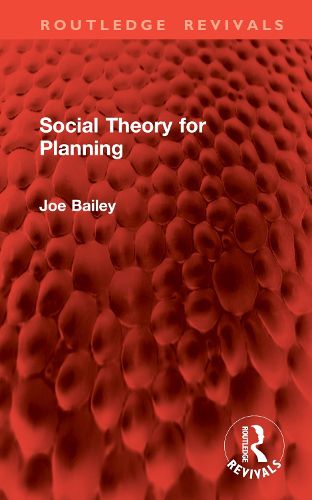Readings Newsletter
Become a Readings Member to make your shopping experience even easier.
Sign in or sign up for free!
You’re not far away from qualifying for FREE standard shipping within Australia
You’ve qualified for FREE standard shipping within Australia
The cart is loading…






Planners necessarily use theories of how society works. More often than not, however, these were left unstated or confused. As the scope of planning increased in the 1970s it became vital that planners adopted a more refined approach to the social life which they tried to influence.
Originally published in 1975, Social Theory for Planning brings to the attention of an important group of sociology-users some of the latest developments and insights of social theory at the time. The emphasis is on the value of theory in defining planning problems in sociologically conscious terms rather than in solving them. The advantages of conflict theory, interpretative sociology, evolutionism and systems theory are assessed, and urban sociology and research methods are evaluated in the light of alternative social theories.
The book also aims to reveal the implicit social theories that are assumed in the defining of particular planning problems and makes a plea for the explicit discussion of the theoretical implications of conventional planning knowledge.
$9.00 standard shipping within Australia
FREE standard shipping within Australia for orders over $100.00
Express & International shipping calculated at checkout
Planners necessarily use theories of how society works. More often than not, however, these were left unstated or confused. As the scope of planning increased in the 1970s it became vital that planners adopted a more refined approach to the social life which they tried to influence.
Originally published in 1975, Social Theory for Planning brings to the attention of an important group of sociology-users some of the latest developments and insights of social theory at the time. The emphasis is on the value of theory in defining planning problems in sociologically conscious terms rather than in solving them. The advantages of conflict theory, interpretative sociology, evolutionism and systems theory are assessed, and urban sociology and research methods are evaluated in the light of alternative social theories.
The book also aims to reveal the implicit social theories that are assumed in the defining of particular planning problems and makes a plea for the explicit discussion of the theoretical implications of conventional planning knowledge.